From September 6 to 15,CARC hosted the Oman government youth cadre delegation which consisted of 10 Oman youth cadres led by Amish Huwa, the official of the Ministry of Foreign Affairs of Oman. Except Shanghai, the delegation also visited Hangzhou, Beijing and other places, and held discussions with relevant experts and scholars.

On the afternoon of Sept. 7th, the delegation visited CARC in Songjiang Campus of SISU. The Secretary-General and Executive Director of the Central Council, Professor Wang Guangda, held discussions with the members on the theme of “70th Anniversary of the Founding of the People's Republic of China: Achievements, Experience and Prospects”. Professor Wang introduced to the members the development of the People's Republic of China in the past 70 years, focusing on the new development concepts of innovation, coordination, greenness, openness and sharing in the new era, emphasizing that the “Belt and Road” initiative has brought new platform and new opportunities for China-Arab cooperation. The representatives of Oman are very interested in China's future high-tech development and high-tech economy. They believed that China's exports have shifted from low value-added products to high-tech products, and hoped that more Chinese companies will invest in the Oman market and more Chinese friends will travel to Oman.
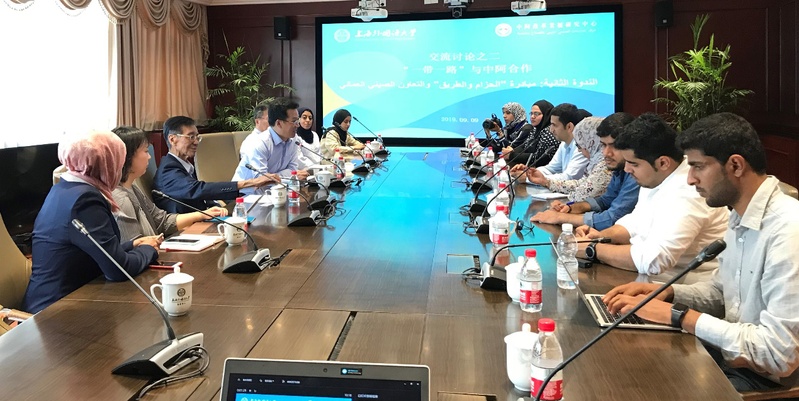
On the morning of the 9th, Professor Zhu Weilie, Director of the Central Experts Committee; Professor Wang Youyong, Deputy Director of the Center;Professor Wang Guangda, Associate Professor Chen Yueyang, and Professor Ibtisham met with members of the delegation at the Rhine Hall of the International Conference Hall of Hongkou Campus, held a discussion in “Belt and Road initiative and China-Arab cooperation. Professor Zhu Weilie pointed out that more direct and efficient cooperation should be carried out between the two countries. Professor Wang Youyong and Professor Ibtisam introduced and explained the connotation, concreted implementation and China's development concept of the “Belt and Road” Initiative to the representative of Oman. Associate Professor Chen Yueyang shared the experience of participation in the protection of intangible cultural heritage, believed that the China-Oman cultural exchange is a model of cooperation between South-South countries, hoped that China and Arab countries would organize more research and education cooperation among universities in the future. The young cadres of the delegation expressed their appreciation and support for the “Belt and Road” initiative, and raised issues related to the content of their respective fields of work. They looked forward to more practical cooperation between China and Arab countries under the “Belt and Road” framework.

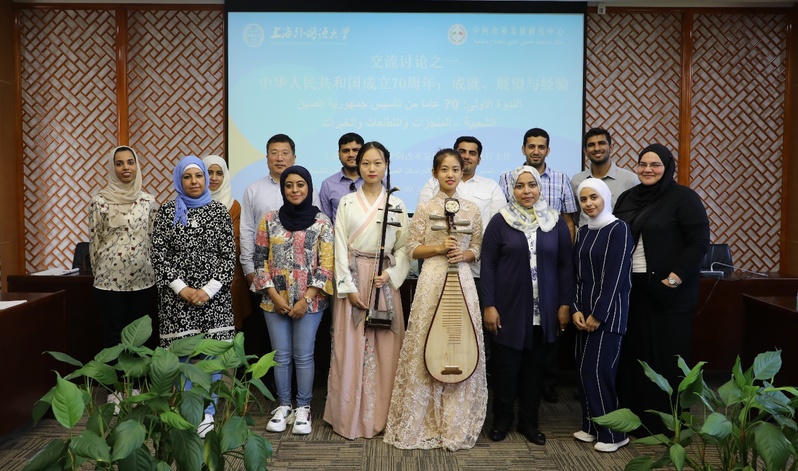
During the visit in Shanghai, the delegation visited the Shanghai City Planning Exhibition Hall, the Guangfulin site of ancient culture, the old downtown and the buildings along the Huangpu River on the Bund to experience the city's charm and cultural connotation. In addition, the Oman guests also took a lively and interesting calligraphy experience class, enjoyed the performance of classical Chinese musical instruments Erhu and Pipa, and experienced the richness of Chinese traditional culture.
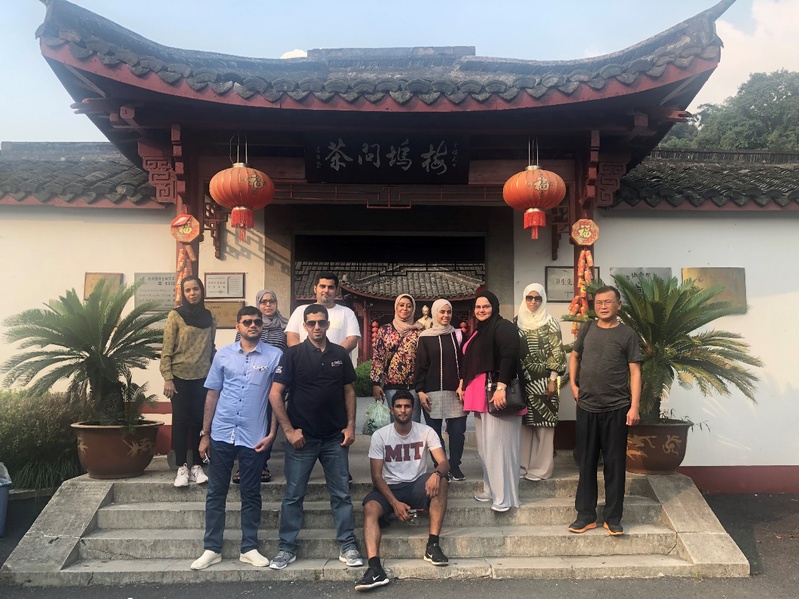
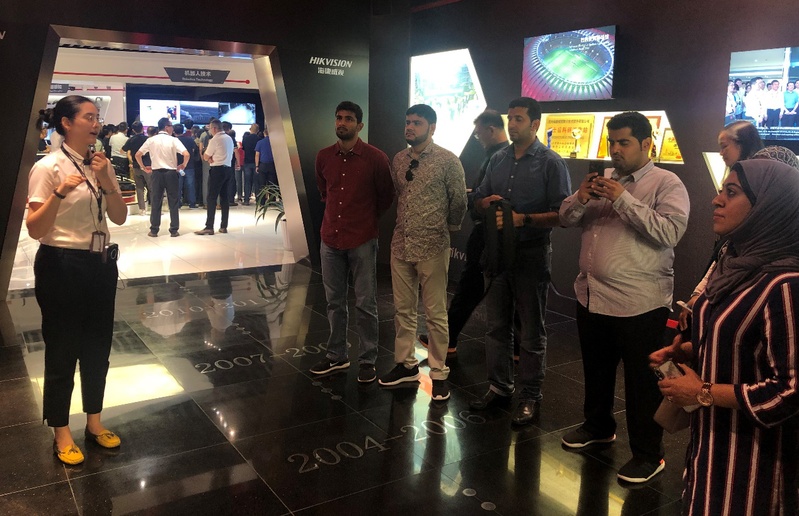
On Sept. 10th and 11th, the Oman delegation came to Hangzhou, China's land of fish and rice, the capital of silk. Oman friends learned more about the development history and cultural origins of Chinese silk at the China Silk Museum. They felt the cultural charm of the ancient Chinese and Song dynasties in Songcheng, and traced the historical beauty and humanistic accumulation of the “Belt and Road” initiative. In addition, the delegation also visited Hangzhou Hikvision, and learned about the company's leading security products and video technology, especially its independent core technology, research and development capabilities and global business strategy. The Hikvision Middle East branch is located in Dubai, United Arab Emirates, and the delegation welcomed the development of their business in Oman to provide more targeted localization services.

On the morning of Sept. 12th, the delegation began a series of exchanges and field trips in Beijing. Li Chengwen, Ambassador of the China-Arab States Cooperation Forum of the Ministry of Foreign Affairs, Board Chairman of CARC, met with the delegation of Oman. Ambassador Li introduced the development achievements and the two hundred years struggle goal that China has achieved in the past 40 years of reform and opening up, emphasized that Oman's friendly relations with China have a long history. The current economic and trade volume between the two countries is growing, Oman and Arab countries are welcomed to participate in the construction of the “Belt and Road” and achieve a common development. In addition, Ambassador Li also mentioned the current challenges facing China-Arab relations, including the interference of some Western countries and the agent war launched by them. Mentioning the important point that President Xi Jinping emphasized in his speech at the headquarters of the Arab League, strengthening dialogue, accelerating development, conforming to national conditions”
Later, the representative of the Oman side actively expressed their views on China-Arab relations and the “Belt and Road” initiative. Ahmad, the technical analyst at the government of Oman, said that some Western countries distorted the essence of the “Belt and Road”, and the participation of the two “Belt and Road” International Cooperation Summit and the results of the conference showed that the “Belt and Road” is a popular initiative in the world. The head of the Localization of Employees office of Oman Petroleum Development Company, Khalid, pointed out that “Those who travel alone go fast, but those who travel in company go far. The current world is constantly changing. We must be prepared to face all changes together.
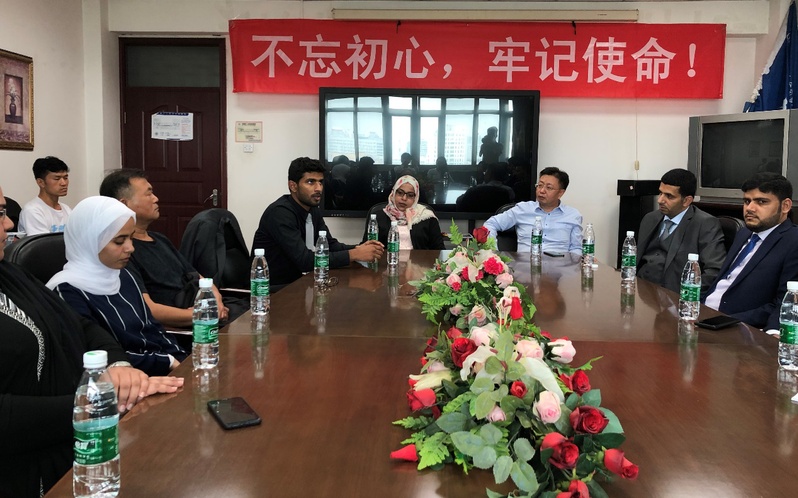
On the afternoon of Sept. 12th, the delegation came to the University of International Business and Economics to hold a discussion and exchanges with the teachers and students. Professor Ding Long, Associate Dean of the School of Foreign Languages of University of International Business and Economics; Associate Professor Huang Hui, Director of the Department of Arabic, and students from the Arabic language and international students from Oman attended the forum. The Chinese host welcomed the arrival of the Oman Youth Cadre Group and pointed out that Oman is an important part of the “Belt and Road initiative. The youths of the two countries are important envoys for enhancing communication and friendship. During the exchanges, the two sides are most concerned about issues such as high-tech industry development and investment, education and scientific research cooperation, and tourism. The representative of Oman said that Chinese technology companies are welcomed to invest in Oman. It is hoped that the two governments can support students from both sides to visit each other and look forward to more Chinese friends to travel to Oman.
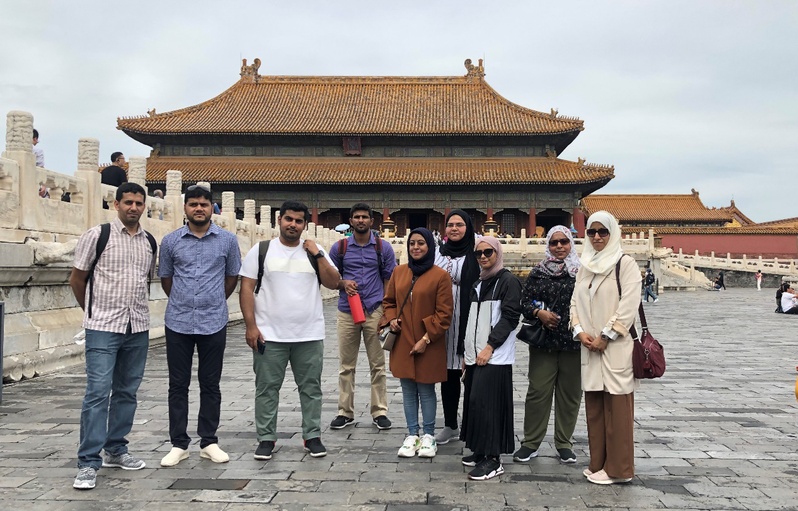
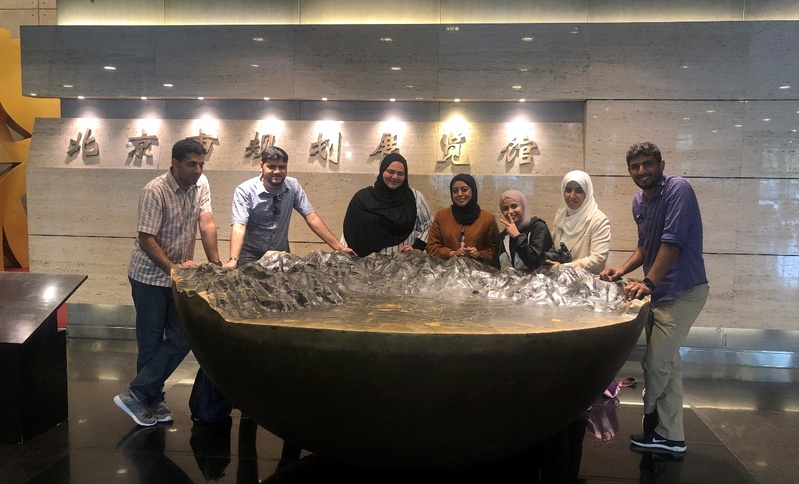
During the period from Sept.12 to 15 in Beijing, the delegation visited the cultural landscapes such as the Forbidden City, the Great Wall and other symbols of Chinese civilization, and appreciated the development culture and spirit of modern China in the Bird's Nest and the Water Cube (Olympic Park). In addition, the Oman youth cadres also visited the National Museum and the Beijing Urban Planning Museum to learn more about the great rejuvenation of the Chinese nation through detailed exhibitions.

The friendly relationship between China and Oman has been strong for a long time. On May 25, 1978, the two countries established diplomatic relations. Oman has always supported China on issues involving core interests and major concerns. On May 25, 2018, the relationship between the two countries was upgraded to a strategic partnership. Cooperation in various fields was smoothly carried out under the framework of the “Belt and Road”. Young people are the promoters and relays of future development. As President Xi Jinping pointed out, it is necessary to promote the interconnectedness of the world's youth, to be the messenger of cultural exchanges between countries, and to promote the harmonious coexistence of different civilizations. The event further promoted the exchanges and interactions between the youths of the two countries and made active efforts to promote the exchanges between Chinese and Arab countries.
